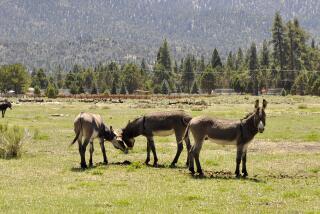Burly Bear Expands Its Territory
- Share via
NEW YORK — David Mandel and Steve Lookner are building an audience one college dorm room at a time.
They’re co-hosts of “Dave and Steve’s Video Game Explosion,” the most popular program on Burly Bear, a television network most people over age 25 have never heard of.
The two sit, Wayne and Garth-like, in front of a camera, and expound upon the latest electronic toys. Instead of thumbs-up or thumbs-down, their rating scale ranges from “buy it” to “turn off your console, go outside and get some fresh air.”
Now Burly Bear has roamed off of college campuses. Its shows can be seen twice a week on TBS: 11 p.m. on Wednesdays and various times on Thursdays (though it is preempted from Thursdays through the month of April).
“We’re distinguishing ourselves as producers of high-concept, relatively low-cost programming with lots of fresh faces and energy to burn,” said Howard Handler, Burly Bear’s chief executive.
Burly Bear was started in 1995 by five friends from Connecticut. While on a ski vacation, they saw a TV channel devoted strictly to vacation resorts that was only available at those locations.
Just out of college, they thought a similar network aimed at 18- to 24-year-olds would work, believing that few existing networks spoke that age group’s language.
Universities across the country had been wiring their dormitories for cable TV. They had room on those systems for a handful of channels specific to them, but few ideas about what to show. Burly Bear stepped into the vacuum.
The network is now available on 450 campuses and occasionally is offered on cable systems that serve college towns.
They get shows like “Half Baked,” a rock ‘n’ roll cooking program; “Impostor,” a hidden-camera show that stages stunts like sending preppy breakdancers to the sidewalks of Harlem; and “Celebrity Highway,” a cartoon that mocks celebrities.
A cramped studio in midtown Manhattan is home to Burly Bear shows. Technicians haul out different backdrops for the different hosts.
Burly Bear gets a thumbs-up from Joe Capizzi, a senior at the State University of New York at New Paltz. “I think it’s really funny,” Capizzi said. “It kind of reminds me of MTV’s ‘Jackass,’ in a way.”
Burly Bear is carried on a cable system near SUNY New Paltz, in New York’s Catskill Mountains. Fortuitously, that’s where Lorne Michaels, executive producer of “Saturday Night Live,” has a vacation home. He happened upon Burly Bear one day while channel surfing.
Michaels’ production company, Broadway Video, bought a majority stake in Burly Bear in 1997.
Two of the founders, James Mairs and Matt Fry, started an independent production company to make “Half Baked.” The show has just ended its run at Burly Bear.
The new management has stayed generally true to the original mission, but “when you take on bigger entertainment partners they bring a certain quality to it,” Mairs said. “It loses its innocence a little.”
Burly Bear has an advantage over its chief competitor, the College Television Network, because its programming is available in dorm rooms while CTN can only be seen in common areas.
But Burly Bear may soon face a behemoth. Viacom is reportedly considering launching an MTV spinoff, called MTVU, that would compete directly on college campuses.
That’s a compliment to the idea of Burly Bear, but it could be a threat. “I don’t know if that will mean the death of Burly Bear,” Mairs said. “MTV is such a monster, and they are so effective at delivering products that people that age really love.”
Burly Bear wants to expand slowly, perhaps adding more hours on TBS. But the network plans to remain true to its college roots and form of distribution, Handler said. It has tried different marketing ideas, including a partnership with NBC to produce Winter Olympics programming in the weeks leading to the Games.
More to Read
The biggest entertainment stories
Get our big stories about Hollywood, film, television, music, arts, culture and more right in your inbox as soon as they publish.
You may occasionally receive promotional content from the Los Angeles Times.










